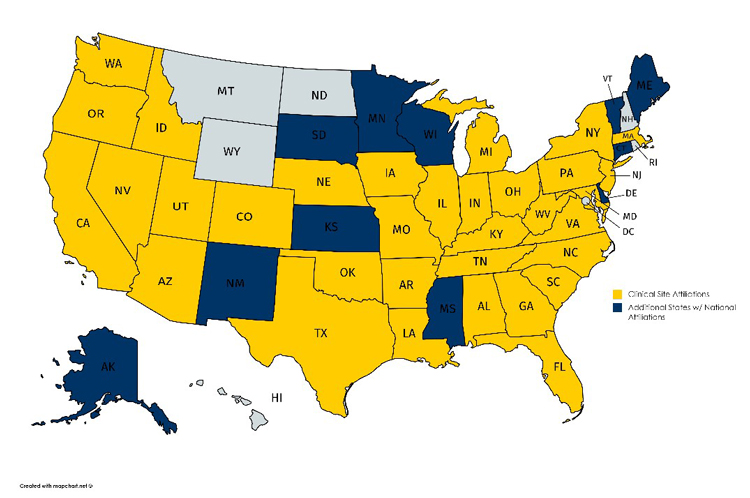The DPT curriculum builds semester by semester to facilitate development of knowledge and skills.
Mount St. Joseph University delivers high-quality academics, hands-on experiential learning and individualized attention from faculty and staff who are devoted to the success of students. We do so while consistently living a culture of ethics and service.
The Mount’s DPT Program is a 117 credit hour, 9 semester, 3 year curriculum designed to build from semester to semester as students develop the necessary knowledge and skills to be professional and proficient physical therapists. The first year presents foundational knowledge from which students can build initial clinical skills, culminating in short inpatient and outpatient clinical experiences. The second year clinical courses, organized by practice pattern and patient population, build from the basic knowledge and skills of the first year. The third year builds upon the prior two years and culminates in four full-time clinical internships, which include inpatient and outpatient experiences. Core course series proceed developmentally through the curriculum and include research, professionalism, foundational science (pathology, medical management), patient management and clinical experiences.
MSJ DPT Curriculum Plan
Credit Hours:
117 credit hours over 9 semesters (3 years)
| CREDIT HOURS | THEME |
| 28 | Foundational Sciences series |
| 6 | Research and Evidence-based Practice series |
| 14 | Professionalism and Healthcare series |
| 12 | Introductory Clinical Skills and Reasoning series |
| 35 | Advanced Clinical Skills and Reasoning series |
| 22 | Direct Patient Care series (full-time work in healthcare – 40 weeks) |
MSJ DPT Curriculum Plan
Summer (11 credit hours)
- BIO 526: Gross Anatomy (8)
- PT 605: Clinical Exercise Physiology (3)
Fall (16 credit hours)
- PT 601: Foundational Science I (4)
- PT 603: Surface Anatomy (1)
- PT 608: Biomechanics and Kinesiology (4)
- PT 624: Neuroscience (3)
- PT 650: Professional Socialization I (2)
- PT 661: Research I (2)
Spring (15 credit hours)
- PT 610: Basic Patient Care Skills (3)
- PT 611: Therapeutic Modalities (3)
- PT 612: Basic Exam & Evaluation (3)
- PT 615: Therapeutic Interventions (3)
- PT 651: Professional Socialization II (2)
- PT 652: Professional Practice I (1)
Summer (11 credit hours)
- PT 780: Introductory Clinical Education Experience (2)
- PT 702: Foundational Science II (3)
- PT 762: Research II (3)
- PT 770: Leadership and Administration (3)
Fall (18 credit hours)
- PT 703: Foundational Science III (2)
- PT 715: Acute Care (4)
- PT 720: Orthopedics I (6)
- PT 722: Neuromuscular Rehabilitation I (3)
- PT 746: Pediatrics (3)
Spring (17 credit hours)
- PT 721: Orthopedics II (6)
- PT 725: Neuromuscular Rehabilitation II (4)
- PT 745: Special Populations (3)
- PT 747: Geriatrics (3)
- PT 754: Professional Practice II (1)
Summer (12 credit hours)
- PT 853: Healthcare Policy (3)
- PT 863: Research III (2)
- PT 875/PT 876: Electives (3) (Minimum of 3, maximum of 6)
- PT 881: Clinical Education Experience I (5)
Fall (6 credit hours)
- PT 882: Clinical Education Experience II (5)
- PT 855: Professional Practice III (1)
Spring (11 credit hours)
- PT 883: Clinical Education Experience III (5)
- PT 884: Clinical Education Experience IV (5)
- PT 857: Professional Practice IV (1)
DPT students get hands-on experience through integrated and terminal clinicals in various healthcare facilities.
DPT students get practical experience through short-term and long-term clinical experiences, totaling 40 full-time weeks of clinical education in a variety of practice settings. The University maintains contracts with over 300 clinical organizations to provide diverse practical experiences for students.

The majority of clinical sites are located within Ohio, Kentucky, and Indiana. However, students should expect to travel outside of the Greater Cincinnati area for at least one clinical experience. It is important for students to participate in a stimulating and diverse clinical experiences therefore, the MSJ DPT Clinical Education Network includes facilities in all 50 states, Washington DC, Puerto Rico, and Canada. Availability of specific clinical sites varies from year to year. Prospective students should be aware that physical therapy interns pay tuition during their rotations and very few clinical sites are able to offer stipends.
The University is always looking to add new clinical partners who can offer unique, high-quality, intentional clinical education opportunities for students. Faculty, students, alumni, or clinical facilities should contact Director of Clinical Education, Jamie Bayliss at (513) 244-4647 or by email to recommend a clinical partner organization for the MSJ DPT Clinical Education Network.
CCIP Level 1 Course - Mount St. Joseph University - Saturday, January 17th & Sunday, Januanry 18th, 2026.
APTA - CCIP Online System Instructions Application
CCIP Level 1 MSJ Course - Registration & Payment
CCIP Level 1 Course - Southern CE Consortium - Saturday, March 7th & Sunday, March 8th, 2026.
APTA - CCIP Online System Instructions Application
CCIP Level 1 Southern CE Consortium Course Flyer
CCIP Level 1 Southern CE Consortium Course - Registration & Payment

